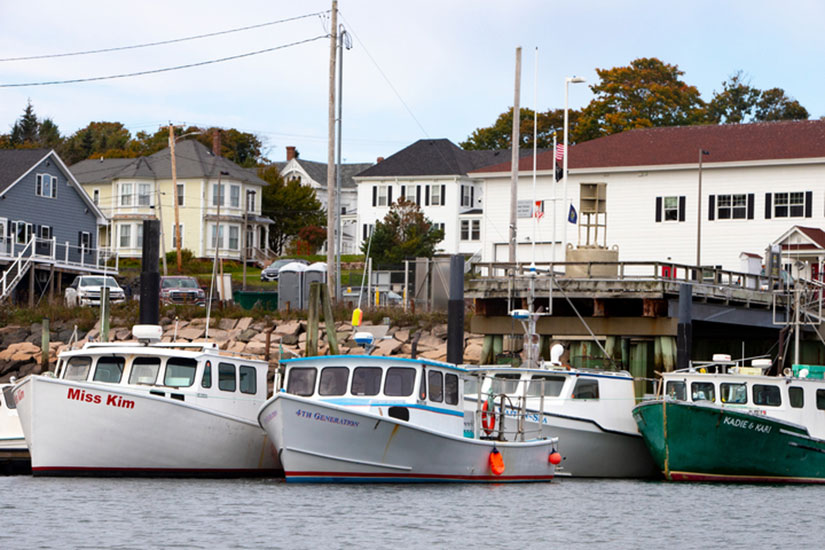Cohort 1: Eastport, Maine
The Eastport, Maine, Energy Technology Innovation Partnership Project (ETIPP) informed efforts to develop a microgrid, coordinate with other energy efficiency efforts, and educate residents.

Project Summary
 Population Size
Population Size
1,288 year-round residents
 Technology Focus
Technology Focus
Tidal, solar, battery energy storage systems, and microgrids
 Lead Lab
Lead Lab
National Laboratory of the Rockies
 Regional Partner
Regional Partner
ETIPP technical assistance created a roadmap for Eastport to develop more renewable and resilient energy systems that may offer economic benefits through better rate access, rate structures, less expensive power sources, community solar, fewer disruptions, and more access to incentives for community members.
Eastport is located at the end of a 40-mile transmission line, with the last 20 miles served by a line that runs along causeway-connected islands bordering the Bay of Fundy and the Gulf of Maine. The line is exposed to extreme weather conditions, which contribute to frequent power disruptions. In 2018, the system backup (a diesel generation system) failed and was not replaced, leaving the community even more vulnerable to outages.
In addition to power outages, one of the most striking energy challenges Eastport faces is the increasing cost of electricity. Versant Power, the community’s utility, increased electric rates by more than 40% from 2022–2023, after an 88% increase the previous year. Eastport has been federally designated as an area of economic disadvantage, and high energy bills are a major concern for residents.
Project Results and Publications
Eastport Energy Resilience Opportunities, NLR Presentation (2023)
ETIPP analyzed ways to ensure Eastport has a power system that can withstand or quickly recover from storms or other disruptions. According to NLR research, local tidal power is one of the strongest in the country, and the Ocean Renewable Power Co. seeks to capitalize on this resource, potentially using it to power a community-based microgrid.
Project Outcomes
The project explored two scenarios for microgrid ownership: a regional microgrid owned by Versant and the Ocean Renewable Power Co., and a school campus-based microgrid owned by the city. The larger regional microgrid concept would include a battery energy storage system at the Versant substation, tidal turbines, a shore station to serve the turbines, and a utility-scale solar farm. When in islanding mode and disconnected from the grid, the proposed regional microgrid would provide backup power to the whole city of Eastport. A smaller microgrid scenario on the school campus would provide the community with a public gathering place for about a week during emergency events such as extreme weather. This microgrid concept could be powered by solar or other renewable energy sources and enabled by a battery storage system that could work with existing diesel-fueled backup sources.
ETIPP also analyzed and calculated energy savings through efficiency efforts for Eastport homes. ETIPP modeled the potential for energy savings in the average Eastport home through weatherization, lighting, heat pumps, and electric vehicles. Eastport and the nearby Tribal community of Sipayik engaged with Window Dressers to kick off a community window insert buildout so community members could directly experience the benefits of these custom inserts built by community volunteers.
Key Takeaways
Leaders in small communities wear many hats, and during a leadership transition, there is not always a bench of other community stakeholders to engage. Eastport addressed this challenge by pulling an Island Institute fellow assigned to Eastport into the project. Using high-performing service fellows or similar professionals can be an excellent option to temporarily address capacity limitations in small communities. However, limitations of working with fellows include that service fellows do not always have a deep understanding of or experience with the community, may require strong support and supervision, and often move on at the end of their term.
The local ETIPP stakeholder group included a mixture of individuals with low levels of familiarity or experience with energy transitions and representatives from the utility (Versant) and tidal power company (Ocean Renewable Power Co.). This created an excellent opportunity for diverse perspectives and learning, while also setting up a challenging dynamic in which the “experts” sometimes dominated discussions. It’s important for the regional partner to play a strong role in meeting facilitation and translation to ensure all voices and perspectives are valued and considered.
Opportunities and Impacts
In July 2023, the Island Institute was awarded a $100,000 Energizing Rural Communities Prize from the U.S. Department of Energy on behalf of the City of Eastport to continue community engagement, support in community capacity, and to develop a partnership with the Passamaquoddy Tribe of Sipayik and other stakeholders.
Through the ETIPP process, key stakeholders from the community, the utility, and the tidal power generation company developed strong lines of communication and a working relationship that set up the community for successful implementation. Eastport’s ETIPP stakeholders also worked together to engage the Passamaquoddy Tribe at Sipayik and the Maine Governor’s Energy Office to submit a funding proposal to develop the microgrid and renewable energy system, using ETIPP’s technical assistance to inform the application. The Maine Governor’s Energy Office in August 2023 applied to the Office of Clean Energy Demonstration for approximately $27 million in federal funds, with a $6.5 million local cost share, to develop a $33.5 million renewable energy/microgrid system for Eastport and Sipayik.
Additional Information
Energy Resilience Planning Begins in Eastport and Islesboro, Island Institute (2021)
Maine Company Plans To Bring Tidal Power Back to Eastport, The Maine Monitor (2022)
Resilience at the Edge: City of Eastport Considers Harnessing Tidal Power for Island Microgrid, NLR News (2024)
Tapping the Power Of the Sea: Company To Begin Testing Tidal Systems Again, The Maine Monitor (2023)
Share
Last Updated Dec. 7, 2025
